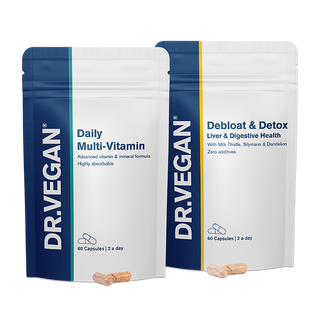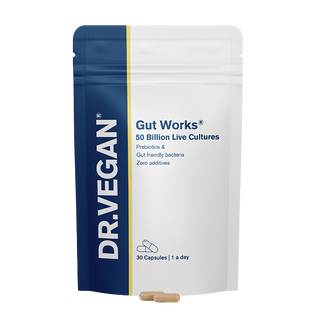What is IBD (Inflammatory Bowel Disease)?

Inflammatory Bowel Disease (IBD) is a chronic condition that effects millions of people worldwide. It is characterised by inflammation and damage to the digestive tract, specifically the intestines and colon. Expert nutritionist Clemmie Oliver (ANutr, mBANT), and founder of The Nutrition and Lifestyle Medicine Clinic, explains IBD, how it differs from Irritable Bowel Syndrome (IBS), and what to do if you believe you have IBD.
You may also enjoy 'Common and Uncommon symptoms of IBS' and reading the latest research into gut health and the causes of IBS.
What is Inflammatory Bowel Disease (IBD)?
Inflammatory Bowel Disease (IBD) is a term used to describe two main conditions: Crohn's disease and Ulcerative Colitis. Research conducted by Crohn's & Colitis UK in 2022 suggests 1 in every 123 people in the UK have either Crohn's disease or ulcerative colitis. While Crohn's Disease & Ulcerative Colitis are the two most common forms of IBD, there are also other types, including IBDU (unclassified) & Microscopic Colitis.
Understand your diet. Create your free Diet Profile today.
These life-long conditions can cause painful sores (ulcers) and inflammation (swelling) in the gut. IBD is an autoimmune disease where our immune system malfunctions and mistakenly attacks healthy cells, tissues and organs. People with IBD go through periods of time where their condition is active (flare) and periods where their IBD is not active (remission). IBD affects at least 500,000 people in the UK (around 1 in 123) and millions of people worldwide.
What is Irritable Bowel Syndrome (IBS)?
Not to be confused with Inflammatory Bowel Disease (IBD), Irritable Bowel Syndrome (IBS) is a common condition that affects the digestive system. Research shows 46%* of people regularly suffer symptoms of poor gut health, and 11%* experience extreme symptoms of poor gut health, many of which are symptoms of IBS.
IBS is a functional bowel disorder, meaning symptoms of IBS are not explained by identifiable structural or biochemical abnormalities (like in IBD), but rather by a disturbance of the normal bowel functioning.
What are the symptoms of IBS?
IBS causes symptoms including stomach cramps, bloating, diarrhoea and constipation. These symptoms can come and go over time and last for days, weeks or months. IBS can be very frustrating to live with and significantly impact quality of life.
Is there a cure for IBS?
There's no single cure for IBS, but changing eating and lifestyle habits, taking probiotics and prebiotics, and medication if needed, can all help control symptoms. There is often a root cause or a number of different factors that can make symptoms worse. Identifying the causes and changing these can hugely help in reducing symptoms and improving quality of life. Learn more about the common and uncommon symptoms of IBS.
Similarities and differences between IBD and IBS
While there can be similarities in some symptoms between IBS and IBD, there are some very important differences, including the extent of symptoms, the presence of inflammation, treatments and outcomes.

Is it possible to have IBD and IBS?
Although they are two different conditions, you can have IBD and IBS simultaneously. Even in remission, some people with IBD can experience ongoing functional digestive symptoms, which are often diagnosed as IBS. Dietary changes can help to manage symptoms of both IBD and IBS.

Can IBS lead to IBD?
No, IBS can't lead to IBD, because IBS is a functional disorder. While symptoms of IBS can be very unpleasant and impact quality of life, they usually do not lead to anything more sinister.
Daily Digestion Bundle

What to do if you are experiencing symptoms?
If you are experiencing gastrointestinal symptoms or notice a change in your bowel habits including:
- passing a bowel movement more often than usual
- looser or firmer bowel movements
- bleeding from your rectum
- unexplained weight loss
you should book an appointment to see your GP as soon as possible.
Your GP may suggest a blood test and a stool test to see if there is anything like inflammation present. Depending on these results, you may be referred to gastroenterology (a doctor who treats digestive disorders) for further assessment.
Clemmie Oliver is Registered Associate Nutritionist (ANutr) and Nutritional Therapist (mBANT). Clemmie founded The Nutrition and Lifestyle Medicine Clinic, which supports patients with a compassionate, educational and positive approach to nutrition to help them optimise nutritional intake, reduce nutrient deficiencies, remove fear of food, and help them manage their symptoms and improve their quality of life with Inflammatory Bowel Disease.
*This article contains data from UK surveys conducted by DR.VEGAN®. All survey findings reflect our own research efforts and have not been influenced or verified by any external organisations or third-party entities.
Want to hear more from our nutritionists? Sign up to our email newsletter for insights, advice and offers:


















